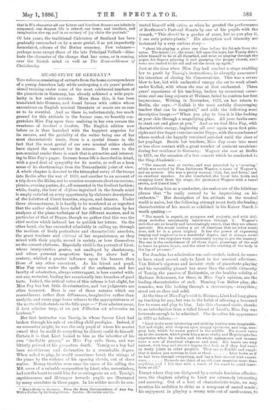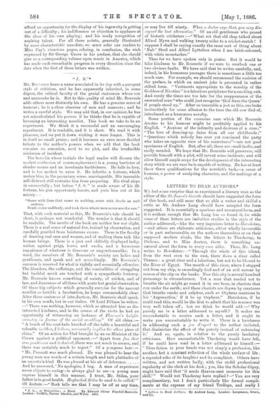MUSIC•STUDY IN GERMANY.*
THIS volume, consisting of extracts from the home correspondence of a young American lady while undergoing a six years' profes- sional training under some of the most celebrated teachers of the pianoforte in Germany, has already achieved a wide popu- larity in her native country. More than this, it has been translated into German, and found favour with critics whose encomiums on English musical literature or music are so rare as to be eventful. And as there is, unfortunately, too much ground for this attitude in the former case, we heartily con- gratulate Miss Fay upon thus realising in her own person the sweetness of lauclari a laudato. The English edition now before us is thus launched with the happiest auguries for its success, and the geniality of the writer being one of her most characteristic traits, there is a special fitness in the fact that the most genial of our own musical critics should have signed the warrant for its reissue. But even to the non-musical reader there is much that is attractive and interest- ing in Miss Fay's pages. German home-life is described in detail, with a good deal of sympathy for its merits, as well as a keen sense of its shorteomings from the Transatlantic point of view. A whole chapter is devoted to the triumphal-entry of the troops into Berlin after the war of 1870, and another to an account of a trip down the Rhine, not to mention numerous short excursions, picnics, evening parties, &c., all recounted in the liveliest fashion ; while, finally, the love of chiffons ingrained in the female mind is amply satisfied on every opportunity by elaborate descriptions of the toilettes of Court beauties, singers, and dancers. Under these circumstances, it is hardly to be wondered at or regretted that the author should have failed to attract attention by her analyses of the piano technique of her different masters, and in particular of that of Deppe, though we gather that this was the chief motive which induced her to publish her letters. On the other hand, she has succeeded admirably in calling up, through the medium of lively portraiture and characteristic anecdote, the great teachers and virtuosi of her acquaintance, as they mixed with their pupils, moved in society, or bore themselves on the concert platform. Especially vivid is the portrait of Liszt, whose interpretative genius, not unalloyed by charlatanry, and whose personal magnetism have, for above half a century, wielded a greater influence upon his hearers than those of any other executant. As his friend and pupil, Miss Fay came under the spells of the enchanter, and her faculty of admiration, always extravagant, is here exerted with- out any restraint, leading her occasionally into breaches of good taste. Indeed, the critical value of this volume is but slight, for Miss Fay has but little discrimination, and her judgments are often incorrect. Hers is one of those natures which see resemblances rather than differences, imaginative rather than analytic, and every page bears witness to the appropriateness of the motto -which stands on the title-page :—" Pour admirer assez, it 'ant admirer trop, et un pen d'illusion est necessaire an bonhear."
Her first instructor was Tausig, in whose favour Liszt had broken through his rule of avoiding child prodigies. Indeed, if we remember aright, he was the only pupil of whom his master owned that he could do everything be (Liszt) could do himself. Certain it is that Liszt looked to him as the inheritor of his own "ineffable graces," as Miss Fay calls them, and was bitterly grieved at his premature death. Tansig as a boy had been mischievous and destructive to a remarkable degree. When asked to play, he would sometimes break the strings of the piano by the violence of his opening chords, out of sheer malice. Money troubles were once the cause of his selling the MS. score of a valuable composition by Liszt, who, nevertheless, had not the heart to scold him for so outrageous an act. Tausig's capriciousness and ill-temper towards pupils are illustrated by many anecdotes in these pages. In his milder moods be con-
• Music-Study in Germany. From the Home Correspondence of Amy Fay. With a Preface by Sir George Grove. London : Macmillan and Co.
tented himself with satire, as when he greeted the performance of Beethoven's Pastoral Sonata by one of his pupils with the
remark, " This should be a garden of roses, but as you play it, I see only potato-plants." His absorption and intensity are instanced by a very curious story- " about his playing a piece one time before his friends from the notes. The music [i e., the score] fell upon the keys, but Tansig didn't allow himself to be at all disturbed, and went on playing through the paper, his fingers piercing it and grasping the proper chords, until some one rushed to his aid and set the notes up again."
Just at the time when Miss Fay had reached a stage enabling
her to profit by Tausig's instructions, he abruptly announced his intention of closing his Conservatoire. This was a severe blow to be; but with undaunted energy she sot to work afresh
under Kullak, with whom she was at first enchanted. Three years' experience of his teaching, broken by occasional excur- sions and one long sojourn at Weimar, failed to confirm her first impressions. Writing in November, 1873, on her return to Berlin, she says,—" Kullak is the most awfully discouraging teacher that can be imagined," and adds the following most descriptive image :—" When you play to him it is like looking at your akin through a magnifying glass. All your faults seem to start out and glare at you." And so we find Miss Fay, with characteristic energy, beginning all over again upon first prin- ciples and five-finger exercises under Deppe, with the soundness of whose method she happily remained satisfied until the close of her pupilage. Beside her teachers, Miss Fay came into more or less close contact with a great number of eminent musicians during her residence in Germany. Wagner she saw at Berlin in 1871, on the occasion of a free concert which he conducted in the Sing-A kademie :—
" The concert was at twelve, and was preceded by a greeting,' which was recited by Fran Jachmnnn Wagner, a niece of Wagner's, and an actress. She was a pretty woman, fair, fat, and forty,' and an excellent speaker. As she concluded, she burst into tears, and stepping down from the stage, she presented Wagner with a laurel crown, and kissed him."
In describing him as a conductor, she makes use of the felicitous phrase that "he really seemed to be improvising on his orchestra." Her description of his attitude in the musical world is naive, but the following attempt to set forth the leading characteristics of his music as exhibited in his Kaiser March is worth quoting :-
" The march is superb, so pompous and majestic, and with deli- cious melodies occasionally interwoven through it. Wagner's melodies are so heavily and intoxicatingly sweet, that they are almost narcotic. His music excites a set of emotions that no other music does, and he is a great original. It has the power of expressing longing and inspiration to a wonderful degree, and it always seems to me as if two impulses were continually trying to get the mastery. The one is the embodiment of all those vogue yearnings of the soul to burst its prison house, and the other is the cradling of the body in the lap of pleasure."
For Joachim her admiration was unbounded; indeed, he seems to have stood second only to Liszt in her musical affections. Von Billow's vigorous and incisive style of pianoforte-playing and his versatility pleased her more than the subtle virtuosity of Tausig, the passion of Rubinstein, or the healthy solidity of Madame Schumann, for these, in Miss Fay's opinion, are the leading characteristics of each. Hearing Von Billow play, she remarks, was like looking through a stereoscope,—everything stood out so clear and solid.
At the time of Miss Fay's visit to Weimar, Liszt had long given up teaching for pay, but was in the habit of allowing a favoured few to come and play to him. Into this charmed circle, thanks to an introduction from a titled friend of Liszt's, Miss Fay was fortunate enough to be admitted. She describes his appearance in 1873 as follows :-
" Liszt is the most interesting and striking looking man imaginable. Tall and slight, with deep-set eyes, shaggy eyebrows, and long, iron- grey hair, which be wears parted in the middle. His mouth turns up at the corners, which gives him a most crafty and Mephistophelian expression when he smiles, and his whole appearance and manner have a sort of Jesuitical elegance and ease. His hands are very narrow, with long and slender fingers that look as if they had twice as many joints as other people's. They are so flexible and supple that it makes yon nervous to look at them Liszt looks as if he had been through- everything, and has a face seamed with experi- ence He made me think of an old-time magician more than anything, and I felt that with a touch of his wand he could trans- form as all."
Except where they are disfigured by a certain feminine effusive- ness, the chapters relating to Liszt are extremely interesting and amusing. Out of a host of characteristic traits, we may mention his ambition to shine as a composer of sacred music ; his enjoyment in playing a wrong note out of carelessness, to afford an opportunity for the display of his ingenuity in getting out of a difficulty ; his indifference or objection to applause at the close of his own playing; and his ready recognition of aspiring talent. For all these points, generally illustrated by some characteristic anecdote, we must refer our readers to Miss Fay's vivacious pages, echoing, in conclusion, the wish expressed by Sir George Grove in his preface, that she should give us a corresponding volume upon music in America, which has made such remarkable progress in every direction since the date when the first of these letters was written.





































 Previous page
Previous page